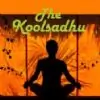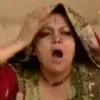Ok people,
I haven't watched today's episode yet, but this is about yesterday's temple scene. In spite of all our fulminations I have to confess to being an idiot romantic and really getting a rush from those moments. When I try to analyze my response, the music - as those wily music directors know perfectly well - plays a crucial part. The beauty of the Sanskrit lyrics is overwhelming, as is the sweet familiarity of the Marathi text. So here's me, trying to forget all this engagement nonsense, and looking at the scene again from Manav's perspective:
He wiped the grease off his hands, impatient to get home where he knew she was always just a few feet away, yet unwilling to face his mother's harangue again. What he had done at the temple had come as no surprise to him. He was angry with himself and everyone else for being made to go through the sindoor ritual with Shravani. It had felt wrong and unnatural and completely forced. Shravani was not the partner of his heart nor ever would be. He was intensely aware of Archana's heartbroken expression that day, and the droop of her shoulders at his mother's exultance. The priest, after all, had merely made a suggestion, one he could easily have ignored. But looking beyond the priest at the image of the god he had worshipped ever since he could think, the lines of the madhyanya aarti ran through his head, familiar in their richness: ghalin lotangan vandin charan/ dolyaneepahin rup tujhe/ preme alingin anande pujin/ bhave ovalin mhane nama…..karomi yadhat sakala parasmai/ narayana yeti samarpayami I will bow low to you and adore your feet, my seeking eyes will find at last the vision of your grace. I will hold you close to myself, and take your name endlessly, to you I surrender myself, God of all living beings. Surely that God, to whom he had prayed every day of his thinking life, had planned good things for him? What WAS that God's grace, if not the finding and cherishing of true love, such a love as this woman had given him? Everything in him rebelled against the life that lay before him without Archana, a life shorn of meaning and truth and beauty. Surely Bappa meant for them to come together again? Samarpayami…. I surrender myself to your will. Why else would the mangalsutra have returned so magically, why else would the two of them be standing there in His presence, with the priest's thaal outstretched, the little heap of sindoor glowing on it, and growing between them the sureness of their mutual love and need. He put his hand out and took a pinch of sindoor. He felt her surprise and looked down into her startled eyes. They stood there for several moments, dazed by the intensity of it all. Then he raised his hand to her forehead and there it was again, his sindoor where it should always have been, making more beautiful the only woman he had ever loved.
OK, back to reality, there are two other religious lyrics referenced:
a) the Ram-Ram-Raja-Ram Hindi chant is meant for North Indian viewers (since Maharashtrians, though they worship Ram too, do so in a milder form, and don't regard him in quite the same way as do North Indians) and a reference to Manav's fidelity to his wife, so (while I'm emphatically NOT a fan of the way Ram treated Sita) in this case we should be hopeful that Archana won't be exiled, but that instead, Manav, like Ram, will be steadfast in his refusal to commit his real self and in particular his heart and body, to another woman, even if he has to be formally engaged, even married elsewhere.
b) The last text is the tadeva lagnam sankalp part of the traditional puja; the worshipper later announces intent to pray and make offerings on this, an auspicious day:
tadeva lagnam sudinam tadeva/ tarabalam candrabalam tadeva/ vidyabalam daivabalam tadeva/ lakshmipateranghriyugam smarami.
This translates roughly as: "'I meditate on the two lotus feet of the Lord of Lakshmi (i.e. Narayan or Vishnu) because they alone represent the most auspicious time, they alone make a day a good day, they alone are the beneficial strength of all stars combined, they alone are the strength of the moon, they alone are the strength of all education, and they alone are the strength of all devas combined'
Here, the auspicious time is emphasized, when man and wife renew their vows through the sindoor ritual, once partially violated by Sulochana's act at the wedding, and endangered by the acts of both partners, but now attested to once more.
There's a reason why I'm quoting all these texts: the creatives want us to understand that this is the divinely ordained truth to the Manav Archana relationship. How the couple will negotiate this truth in their trying circumstances of course, is the question that the creatives have been progressively getting more and more tied up in knots over. But this scene is not just a part of their usual TRP bungling; if it did get high TRPs because it was also written with specific intent, as everyday television art, it works.































